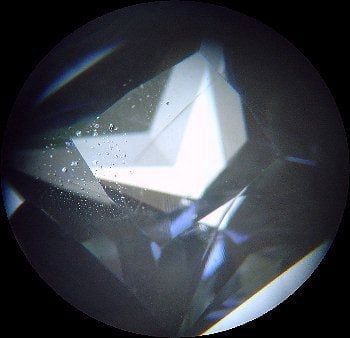Professional Gemologist Certification Course
Identifying Inclusions of Specific Gems
Beryl and Tourmaline
Both beryl and tourmaline develop hollow or “growth” tubes. Gem cutters see many more of these than gemologists do, since they cut away most of these inclusions. While these tubes begin hollow, they may be filled with opaque, white minerals later, as the crystal develops.
You can easily distinguish growth tubes from other inclusions. They have even sides and run straight for considerable distances. When present, you can assume these inclusions indicate a gem is most likely a beryl, tourmaline, or possibly spodumene. A refractive index (RI) reading can then distinguish these minerals.
Corundum
Rubies and sapphires, both corundum gemstones, are some of the easiest gems to identify by their inclusions.
Silk in Hexagonal Patterns
Silk is the most distinctive of corundum’s inclusions. What gemologists call “silk” consists of very fine threads (crystals) of another mineral, rutile. If you can see enough of these inclusions, you’ll note they form a hexagonal pattern. If you can only see part of the threads, they meet at 60° or 120° angles.
Garnet gems contain similar but coarser inclusions. They meet at 70° or 110°. On the other hand, needle-like inclusions occur in quartz with hexagonal patterns as in…
Donald Clark, CSM IMG
Donald Clark, CSM founded the International Gem Society in 1998. Donald started in the gem and jewelry industry in 1976. He received his formal gemology training from the Gemological Institute of America (GIA) and the American Society of Gemcutters (ASG). The letters “CSM” after his name stood for Certified Supreme Master Gemcutter, a designation of Wykoff’s ASG which has often been referred to as the doctorate of gem cutting. The American Society of Gemcutters only had 54 people reach this level. Along with dozens of articles for leading trade magazines, Donald authored the book “Modern Faceting, the Easy Way.”
Never Stop Learning
When you join the IGS community, you get trusted diamond & gemstone information when you need it.
Get Gemology Insights
Get started with the International Gem Society’s free guide to gemstone identification. Join our weekly newsletter & get a free copy of the Gem ID Checklist!
